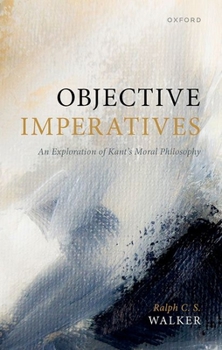Objective Imperatives: An Exploration of Kant's Moral Philosophy
Kant held the moral law to be an objective imperative, an entity in its own right. It carries with it prescriptive force, in parallel to other principles of pure reason, like those of logic and mathematics. Objective imperatives therefore do not derive their authority from any other source, such as common consensus or the will of God. In Objective Imperatives, Ralph C. S. Walker seeks to show that this is a highly defensible view: Kant's Categorical...
Format:Hardcover
Language:English
ISBN:0192857061
ISBN13:9780192857064
Release Date:December 2022
Publisher:Oxford University Press
Length:208 Pages
Weight:0.80 lbs.
Dimensions:1.2" x 5.7" x 8.2"
Related Subjects
PhilosophyCustomer Reviews
0 rating





